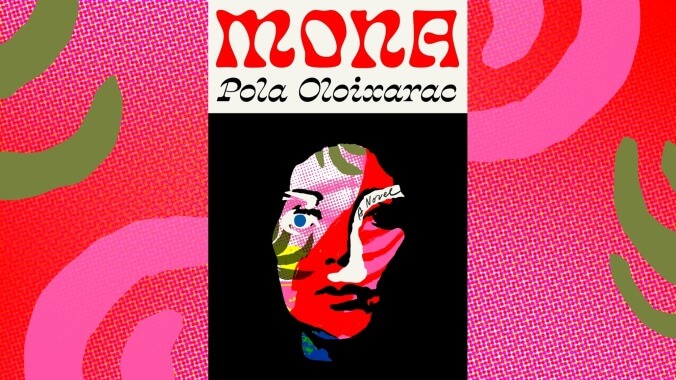Cover image: Farrar, Straus & Giroux Graphic: Natalie Peeples
Mona, the third novel from Argentinean writer Pola Oloixarac, is as restless as its protagonist. At an esteemed gathering of international writers at a Swedish retreat—all of them nominated for a remunerative prize, and all of them trying to be cool about it—Mona drinks, drugs, and keeps reality at a distance as she pursues sex, solitude, symbolism, and other recreations, all while trying not to think about the less-than-enthusiastic response her editor has given her latest manuscript. There are provocative presentations on the state of literature; erotic interludes; and drunken proclamations about the nature of art—all tied together by nothing more than Mona’s memories and desires. It ends with a truly out-of-left-field sequence and a brutally intimate revelation that doesn’t feel wholly earned by the 200 pages that precede it. Lucky, then, that Oloixarac is so damn funny and insightful that Mona is rewarding nonetheless.
Oloixarac’s last novel, the equally slim Dark Constellations, was a heady cyberpunk thought experiment, composed of equal parts outsized literary ambition and self-effacing witticisms. Here, she returns to the more everyday concerns of her debut, Savage Theories, swapping out academia for the world of writing, criticism, and publishing. Not that these intensely self-obsessed authors would consider these matters quotidian, Mona included. “Mona’s thoughts turned to the civilian population, the non-writers, subjected daily to an implacable and assaultive journalistic regimen of clichés and false paradoxes,” goes one such rumination. This is foremost a novel about a powerfully intelligent woman trying to remain comfortable in her own skin, with increasingly unsustainable results. It is also a book about the wonders of words, and those who dedicate entire lives to doing miraculous things with them. That juxtaposition between the prosaic-to-painful nature of existence and the efforts to conjure something greater makes for observations both cutting and empathetic. Oloixarac is an ace Dorothy Parker, with long knives drawn, who nonetheless can’t help feeling the weight of the tragedies that lead to comedy.
The novel begins with the drink-and-drug-fueled Mona departing her doctoral haven at Stanford for the ceremony for the prestigious Basske-Wortz literary prize, for which her last novel has earned a nomination. She is enjoying a wave of acclaim that has marked her as a “savior holding down the front lines of literature,” in part, she suspects, because of her identity: Her novel came out “at a time when being a ‘woman of color,’ in the vede macum of American racism, began to confer a chic sort of cultural capital.” She continually evades the texts of a man romantically pursuing her, while indulging in some online fantasy with another. Upon her arrival in the remote Swedish locale, the conversations begin: about art, about literature, about food and money and social climbing, and above all the insular and elite world of quote-unquote “serious” fiction.
What keeps it all humming along, despite the shaky thematic coherence and occasional navel-gazing, is Oloixarac’s razor-sharp and evocative voice. Her characters’ observations run the gamut from the dryly witty (Mona defines “networking” as “a word Americans use to describe socializing with colleagues, as though they needed a concept to justify kindness and camaraderie at work”) to the brutally wounding (of an overweight French writer’s scornful taunts: “This fat power trip, Lena’s exultant obesity—it was the only sensible minority position within reach of a white Frenchwoman. And Lena had managed to make her feel a bit bad about herself, which Mona always figured was every fat woman’s secret objective.”) But best of all, the author continually makes the ordinary feel surprising. Few are as good as Oloixarac at depicting the sublime awkwardness of aggressive small talk, or at writing a turn of phrase that makes something that’s already been talked about ad nauseam feel funny and honest and new. Here she is describing what makes something a poem: “What’s vital is to communicate the feeling of having somehow swindled language—that surely that couldn’t be a poem.”
Oloixarac’s cringeworthy sex writing has improved somewhat. The author has managed to double down on maintaining a steady parade of sexual situations and grotesqueries while making the overall effect less unintentionally comic. But don’t be fooled—there are still more than a few places where the reader may well glaze over from the blunt-force ridiculousness (“he slowly massaged his cock with delicate movements, as though it were a tubular teddy bear”). However, they aren’t the jarring interruptions they were in Dark Constellations, and sometimes even feel right at home among the absurdities of a self-important literary retreat. Threaded throughout these amusing encounters and raw-nerve confessionals are the thoughts of a philosophically bold writer at work, investigating the strange places where our messy organic bodies and our searching souls overlap. This may be a structurally minor work compared with her previous novel, but Oloixarac has profound things to say, and a great many of ways of saying them.
Author photo: Denise Giovanelli


















![HBO teases new Euphoria, Larry David, and much more in 2026 sizzle reel [Updated]](https://img.pastemagazine.com/wp-content/avuploads/2025/12/12100344/MixCollage-12-Dec-2025-09-56-AM-9137.jpg)






















